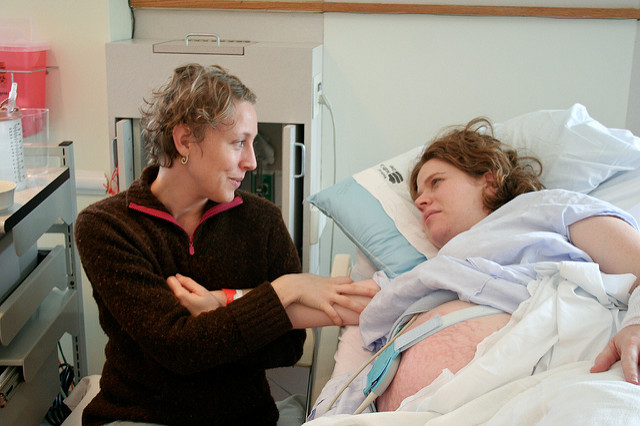
Where do plus-sized mothers give birth? A Q&A with Dr Rachel Rowe
Water births, midwife-led units and surprising research findings were on the agenda for the Big Birthas’ Parenting Science Gang discussion with Dr Rachel Rowe of the National Perinatal Epidemiology Unit.
Image: Eric Peacock CC BY-NC-SA 2.0
Rachel: Hi everyone, thanks so much for inviting me to do this Q&A.
I’m a senior researcher at the National Perinatal Epidemiology Unit in the University of Oxford.
I work on research into the organisation, quality and safety of maternity care, with a particular focus on midwifery led settings e.g. birth centres.
Over the past couple of years I’ve worked on two studies investigating outcomes for women with high BMI planning birth in different settings.
PSG Z: Could you share what you felt were the key findings of these studies?
Rachel: I guess the bottom line is that the labour/birth-related risks for some women with high BMI are not as great as previously thought.
In particular, women with no other ‘risk factors’ who are obese/severely obese and having a second baby have lower labour/birth-related risks than women of normal weight having a first baby.
Most recently we’ve also found that women with BMI 35-40 admitted to birth centres in hospitals have outcomes which are broadly similar to other women admitted to the same birth centres.
PSG Y: Well isn’t that interesting to know! That puts a spanner in the thinking of most of the consultants I saw who automatically assumed high BMI was going to mean problems.
PSG W: You don’t know how happy I am to hear this!
PSG X: Are HCPs who work with pregnant mothers familiar with this or is it really new?
Rachel: So the first point, about obese women with no other risk factors other is from a published paper so it’s in the public domain. The more recent findings about the place of birth we’ve just submitted for publication.
It is important to note that these findings may not apply to everyone…
In our most recent study we found that over 90% of severely obese women admitted to birth centres had a BMI between 35 and 40. And it’s likely that they were ‘selected’ through discussion and planning with their midwives.
PSG Z: Did the first findings (the 2nd baby stats) surprise HCPs? Is there a tactful way of asking whether anyone has disagreed with what you found? ?
Rachel: Yes, I think some people were surprised. Probably fair to say that we were a bit surprised by the findings ourselves.
PSG U: Were those first births uncomplicated or did they also include vaginal instrument assisted births? Or CS?
Rachel: To have no other ‘risk factors’ the previous births would have had to be fairly straightforward, ie, no caesarean, but would have included instrumental births.
PSG V: That’s really interesting! I’m 38 weeks pregnant with baby number 2. My BMI last pregnancy was 39 and dropped to 37 whilst pregnant. This pregnancy my BMI at the start was 39 again but I was weighed last week and again it’s gone down (according to the consultant it is 37 but the midwife said 35 so I’m not sure and not got scales at home to check!)
Everything with my first birth was fairly straight forward but I’m still having to see the Consultant, still not allowed to give birth at the birthing centre and I’m fighting hard to be allowed a water birth (which at the moment I think I’m winning) even though had I been this weight at the beginning then I would have been allowed more choices.
PSG T: This totally backs up my anecdotal conversations with experienced midwives.
The head of midwifery I saw for my home birth was ‘confident’ I’d have the easy birth I predicted. And I did.
She still had to get me to sign off the legal papers that said I knew I was going against medical advice, though…
Hopefully this research will change opinions
PSG S: Can you provide a link or reference to that first piece of research? I would have liked to have had it to hand in my last pregnancy.
Rachel: The impact of maternal obesity on intrapartum outcomes in otherwise low risk women: Secondary analysis of the Birthplace national prospective cohort study. https://obgyn.onlinelibrary.wiley.com/doi/abs/10.1111/1471-0528.12437
Q: That research was in 2013?!! It’s quite shocking that this hasn’t yet really filtered through. What do you think are the barriers for HCP being up to date with this research?
Rachel: Ooh that’s also a good question!
PSG R: I’m not sure it’s individual HCPs that need to be convinced. A lot of the Policies are made at a Trust Level so it’s convincing the right people.
Rachel: In Northern Ireland they have developed guidance for all the midwifery units which gives more flexibility on BMI for alongside midwifery units (birth centres in hospitals).
It’s partly that unless evidence results in a change in national guidance units will be reluctant to change their own guidance
PSG W: Understandable. I’d expect units to be risk averse
PSG T: Absolutely. Maternity litigation cost NHS Trusts a fortune if they wind up having to pay for whole life care.
PSG W: Still annoys me
PSG X: How long would you expect it to take, to change the culture of treating women with high BMI as high risk in second pregnancies, even there is now evidence this is not the case?
How long does it take for evidence like this to affect practice “on the ground”?
Also – could it be that practices relating to weight might be harder to change because there are cultural influences at play (e.g. our society judges people with high BMI negatively)?
Rachel: That’s also a really good question!
To see a big change in practice we’d probably need to see a change in national (NICE) guidelines – they currently advise that women with BMI>35 should be advised to plan birth in a hospital obstetric unit with doctors.
Q: So, has this opened up more avenues of research that you would like to see taking place? I guess surprising results should always lead to more studies……..
Rachel: Well I was surprised to find that while there’s a fair bit of research on the pregnancy experiences of obese women there really isn’t much evidence on their experiences of labour and birth itself.
For example, the extent to which obese women feel that they’re able to have the kind of labour/birth that they want.
PSG Z: That is really surprising! We have started to feel that there is lots of stuff out there about the experiences of women with obesity, but I guess that I haven’t specifically looked at labour.
I wonder whether this is the sort of study that we could look at doing on a small scale. What would you hope to see in such work Rachel?
Rachel: Well I guess my assumption is that women with high BMI may be less likely to get the kind of birth they want – or freedom to make choices/decisions – might be treated less well during labour/birth than other women, but there isn’t really any research evidence about that.
PSG O: Do you think it is possible to focus just on labour and birth experience or do you think it should be combined with looking at whether they felt supported to plan the birth of their choice?
Rachel: That’s certainly part of it and there is a bit more evidence on that, but surprisingly little actually. A lot of the research I’ve read is about experiences of antenatal care with focus on weight loss/management etc
PSG T: That’s certainly my experience, and the experience of women who contact me…
PSG R: We can give you lots of anecdotal evidence on that Rachel!
Rachel: Yes I’m sure you can!
PSG T: So is this something worth us researching, do you think? Providing some data to back up the anecdotes?
Rachel: Yes it might well be. There are certainly some reviews of studies of obese women’s pregnancy experience, but it might well be worth looking more closely at these to see what the gaps are.
Q: So the only age group (I think from reading something recently) where birth rates are increasing is in the over 40s. How much of an added risk factor is this added to high BMI?
Rachel: That’s an interesting question, but a bit harder to answer. In our first study women over 40 with high BMI would have been in our ‘otherwise healthy’ group if they had no other risk factors.
But in our most recent study only about 2% of the women with high BMI in birth centres were over 40 so we’re not able to draw any conclusions about their risk.
Midwife-led Units
Rachel: It’s important to note that in our recent study we did find some differences in outcomes between severely obese and other women admitted to midwifery units/birth centres.
Overall, severely obese women were more likely to have a caesarean section, BUT CS rates were low – 1% in women having second or subsequent baby and 13% in first time mums – and differences between groups were small.
PSG W: Slightly perturbed to find out I am ‘severely obese’ in medical parlance…
PSG R: Me too!
Rachel: I’m sorry! Not necessarily my choice of words either!
PSG W: No, I know, that’s fine! 🙂
PSG T: I don’t know, I prefer it to ‘morbidly’! I think I’m going to coin a new term. ‘Rabidly Obese’, what do you think?
Q: Did your research look at whether these women had support from their midwife/consultant? It would be interesting to know if there is still general resistance to allowing women to ‘try’ a midwife led unit or still want people in a traditional labour ward.
Rachel: It’s not possible from our data to tell if women were planning birth in these birth centres with a ‘care plan’ or after discussion with a midwife.
We could collect a limited amount of data and in the end we thought this would be just too difficult to ask about.
Around 75% of all the units in our study admitted at least one woman with BMI>35 during 2016 so it’s fairly widespread, but mostly small numbers in each unit.
PSG T: At least they are, that’s really heartening to know…
PSG R: Given my Consultant wanted continual monitoring without even seeing me I definitely didn’t feel I had support. Although as there wasn’t a local MLU at that time, so it was a moot point.
Q: Rachel – you focused on MLUs/birth centres. Would more data be found if births in traditional labour wards which were not attended by a doctor were added? We didn’t have a MLU when I gave birth in 2014 but although there were doctors on the ward, I never needed to see one.
Rachel: Yes, I’ sure that’s true. In our previous study all the women were planning birth in a traditional labour ward and many will not have seen a doctor at all.
When we did that study we ended up concluding that it might be safe (and beneficial) for some women with BMI>35 to plan birth in a MLU/birth centre, but we didn’t have evidence on outcomes if they did – hence the second study.
PSG N: There is no MLU in County Durham – labour ward or home birth only. Could be a good source of data for you.
Water Birth
Q: We’ve been discussing how manual handling concerns seem to be behind a lot of the restrictions imposed on women with a high BMI, rather than evidence of risk. Have you come across any research about this?
Rachel: Lots of anecdote, but not much research.
PSG S: That’s interesting as it was specifically highlighted during the risk assessment for my home birth. I was told not to get into the birthing pool until a midwife was there in case I passed out and my husband couldn’t get me out of the pool himself. It seemed a very official and policy led statement.
Rachel: We did find in our most recent study that fewer women with BMI>35 in birth centres used a pool during labour or for birth, but proportions were still relatively high.
PSG T: Was there any reporting that actually birth pools might be MORE beneficial for high BMI mums, or could your study not have shown that?
Rachel: We couldn’t show that, but it’s part of the package I guess in supporting women to have a more straightforward birth.
PSG T: Drat. I have suspicions that it could confer greater benefits for obese women by ameliorating some of the risks, but nothing has shown this yet, (I wrote about it here, quite a way down the page http://bigbirthas.co.uk/labour-birth/water-birth/ but not sure how we could go about proving it – I’m not a researcher!
PSG S: Were any reasons for not using a pool quoted?
Rachel: No, we don’t have that kind of data. Again, anecdotally midwives are concerned about women being able to get in and out of pools.
PSG R: Rachel – what do you think of the apparent double standards when women with high BMI are discouraged from using birthing pools, but encouraged to have baths to ease labour pains?
PSG T: In bathrooms with far worse access!
Rachel: It’s certainly not ideal. Again, not much evidence. Is there a potential research topic around availability of equipment? Or describing local guidance and what I suspect will be variation in that across the country?
The Future
Q: Was there anything in your most recent research that you wanted to explore further but could not in that study?
Rachel: So we don’t have enough data to say anything on women with BMI>40
PSG T: Ah, that’s really interesting.
PSG R: I can’t remember if I was or if I was just under the borderline.
PSG N: I’m over this time. Registrar however has, I think, read your study. She was sure that my risks were lower this time because I didn’t have the big issues last time.
Q: Rachel, has your research been published yet? Can we read it, quote it, wave it in people’s faces yet?
Rachel: Not published yet I’m afraid. I’ve presented it in poster form and in talks at conferences, but it’s with a journal at the moment so won’t be published until later this year I’m afraid!
PSG T: We can wait!
Rachel: If anyone is interested in working a bit more closely with us to help disseminate the findings of this study we’re developing an infographic for midwives/women to summarise the findings. And we’re looking for people to come to a meeting in Oxford where we can work on some ideas
I will pass the details on to the group, but all being well it will take place on 12th June in one of the research buildings where we work. We can pay travel expenses and are working to sort out childcare too if that would help some people to come.
General excited chorus: I’m in! Me too! Totally! Oh yes!
PSG N: As much as I would love to visit my old uni- I’m due on 14th… Maybe next time
PSG W: chicken 😉 x
PSG T: We’d totally catch it!
PSG W: Seriously though – could we sort Skype if you’re not in Labour?
Q: Rachel, who are the other people who are doing important work in this area? What other research groups should we speak to?
Rachel: Nicola Heslehurst in Newcastle has done a lot of work in this area
PSG W: Oo useful – thanks!
Inspired? Want to help do some research to add to the body of knowledge about pregnancy and childbirth for women with a high BMI? Why not join our Big Birthas Parenting Science Gang on Facebook? We’re going to be doing own study and you can help us decide exactly what we do!
And check out some of our other Q&A session related to women with a high BMI:
- What support is offer to pregnant women with a high BMI? with Ellinor Olander
- What problems are faced when pregnant with a high BMI? with Clare Murphy of BPAS
- The experiences of pregnant women with high BMIs with Amber Marshall.
You can read all the other Q&As on lots of subject relating to parenting here: http://parentingsciencegang.org.uk/live-chats-with-the-experts/


